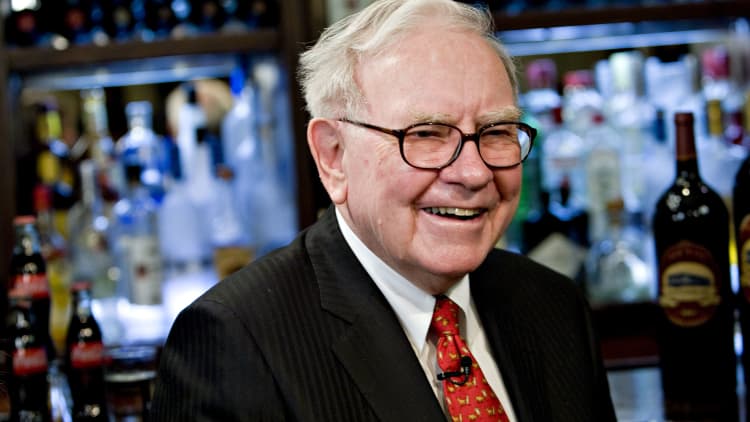At 88, Warren Buffett remains one of the most iconic investors of our time. With an estimated net worth of $78 billion, according to Forbes, the Berkshire Hathaway CEO is currently the world's third-richest person.
Buffett's wealth has been well-chronicled; there are hundreds of articles and books that explain how he came to be called the "Oracle of Omaha."
But you won't find much about how a little-known book by Frances C. Minaker helped shape the investor's business acumen at a young age.
Buffett 'virtually memorized' it
As a kid in Omaha, Buffett was fascinated by anything having to do with numbers and money.
"Very early, probably when I was seven or so, I took this book out of the Benson Library called 'One Thousand Ways to Make $1,000,'" the investor said in HBO's 2017 documentary, "Becoming Warren Buffett."
Published in 1936, "One Thousand Ways to Make $1,000" contains short vignettes of people — from Charles E. Hires (of Hires Root Beer) and James Cash Penney (of J.C. Penney) — who took risks and made enough money to start their own businesses. Each chapter covers a specific topic, including how to start a business, how to invent things to sell and even how to raise money for charity.
Buffett loved the book so much that he "virtually memorized" it, according to a 1988 Fortune profile feature of the billionaire. Inspired by the book's practical business lessons, he began selling Coca-Cola, gum and newspapers door to door.
An underrated business book
I thoroughly enjoyed reading Minaker's take on American entrepreneurship in the early 1900s, but I can also understand why it never gained enough momentum to go mainstream. The book had been out of print for some time and, for the most part, the author is uncannily absent from the Internet.
Moreover, the business world has changed dramatically, and the money-making ideas presented in the book (e.g., goat dairying, manufacturing motor-driven chairs, renting out billiard tables to locals) may seem ancient to the modern reader.
But at its very core, "One Thousand Ways" is about how creativity, excellent salesmanship, hard work and resourcefulness can earn you buckets of money. And the book's underlying fundamentals of business — from marketing and investing to sales and customer relations — remain as relevant today as they were nearly 83 years ago.
Written in an immediate, conversational tone, the book is both entertaining and digestible — so much, in fact, that even your kids can read it (which they probably should if you want them to be grounded, hardworking and smart about money).
Here are three timeless pieces of advice from the book:
1. Make compound interest your best friend.
The chapter about pennyweight scales captivated Buffett the most, he said in the HBO documentary. He figured that if he had one, he'd use it 50 times a day, which made him certain that others would pay to do the same.
"I sat and calculated how much it would cost to buy the first weighing machine, and then how long it would take for the profit of that one to buy another one," Buffett recalled. "I would create these compound interest tables to figure out how to have a weighing machine for every person in the world."
He envisioned himself starting with one machine, pyramiding his take into thousands more. "I [pictured] everybody in the country weighing themselves 10 times a day, and me just sitting there like the John D. Rockefeller of weighing machines," he said.
Buffett was enthralled by the idea that time plus investment can multiply your money — and it further solidified his trademark appreciation for compound interest (a concept that most Americans don't even understand).
2. Enter an enormous market that you understand.
The products and services mentioned in the book (e.g., cigarette humidors, industrial uniforms, tailored suits, greeting cards, handkerchiefs) were used by almost everyone at the time it was written.
A similar theme can be found in Buffett's investment style: Berkshire's portfolio largely consists of companies in big, competitive industries such as real estate, airlines, insurance and food and beverages.
Minaker also emphasizes the importance of sticking with what you know. The folks profiled in the book only sold products and services that they had expertise in — and if they didn't, they had enough interest to learn more about it.
Buffett himself has famously avoided investing in most high-tech stocks (although Berkshire is now a major shareholder in Apple) because he felt that he couldn't predict which firms would do well in the future.
3. Waiting for the "right time" won't make you rich.
It pays (literally) to start young and early — and Buffett knew this well. By the time he was 17, he had already saved up $5,000 (worth roughly $58,000 today).
Despite the book being released in Depression-era America, when the unemployment rate was nearly 17%, Minaker insisted that biggest reason people don't make money is because they keep "waiting for business to get better."
So if you're a procrastinator and in need of motivation, "One Thousand Ways" offers plenty of great lines that are worth putting on your refrigerator door:
- "If you sail straight and keep moving, you'll get to your destination. But you won't get there, or anywhere, unless you start."
- "Business is a game of 'put and take' — you can't 'take out' until you 'put in.'"
- "If you have the urge to go into business or to lay the foundation for a future business by capitalizing your spare time, delay no longer. If you wait for conditions, conditions may leave you in the lurch."
Dave Schools is a freelance editor and brand storyteller. He is the founding editor of Entrepreneur's Handbook, a top-50 Medium publication, and the co-founder of Party Qs app. His work has appeared in Axios, Inc., Smashing Magazine, The Next Web, Business Insider, Quartz and Crunchbase.
Like this story? Subscribe to CNBC Make It on YouTube!
Don't miss:



